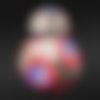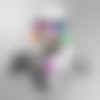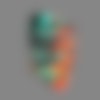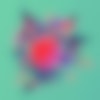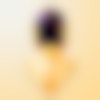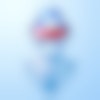29 July 2016
Artist Interview - Justin Maller
Justin Maller is a digital artist and artistic director, as well as a friend of Grovemade. We recently took a few minutes to chat about his creative process, his influences, and his lucky socks.
Tell us a little about yourself; Where are you from, where are you located now, what are you working on?
Born and raised in Melbourne, Australia, I’ve been living in Brooklyn for nearly seven years now. I started making digital art for fun in 1998, and have been doing it full-time since I finished university in 2005. I spend my days working on a variety of projects for my own brand and clients around the world.
Born and raised in Melbourne, Australia, I’ve been living in Brooklyn for nearly seven years now. I started making digital art for fun in 1998, and have been doing it full-time since I finished university in 2005. I spend my days working on a variety of projects for my own brand and clients around the world.

What does a digital artist do?
My boilerplate explanation of what I do is: “make pretty pictures on my computer”. It’s a little reductive, but completely true! I use Photoshop and Cinema 4D to create a variety of work, usually for my own lines of products, and also for campaigns / illustrations for commercial entities. A big part of being a freelance digital artist is the work that goes into running and marketing a small business.
My boilerplate explanation of what I do is: “make pretty pictures on my computer”. It’s a little reductive, but completely true! I use Photoshop and Cinema 4D to create a variety of work, usually for my own lines of products, and also for campaigns / illustrations for commercial entities. A big part of being a freelance digital artist is the work that goes into running and marketing a small business.
Have you always had an urge to create, or did it come along later on in life?
Yeah, I’ve always been pretty creative. When I was younger, I did a lot of creative writing and acting. Art was actually the last thing I tried. It’s still very odd to me every now and then that it’s what I ended up doing professionally!
How did you get into your field?
I discovered Photoshop and then DeviantArt, and got addicted to creating and the creative community. Something about it just really resonated with me; I was instantly passionate about digital art. I put a lot of my free time into experimenting, and then founded Depthcore. Eventually I had just stuck with it long enough that I started getting some commissions, and things organically snowballed over time to the point where I was able to pay my bills without having to hold a day job.
Yeah, I’ve always been pretty creative. When I was younger, I did a lot of creative writing and acting. Art was actually the last thing I tried. It’s still very odd to me every now and then that it’s what I ended up doing professionally!
How did you get into your field?
I discovered Photoshop and then DeviantArt, and got addicted to creating and the creative community. Something about it just really resonated with me; I was instantly passionate about digital art. I put a lot of my free time into experimenting, and then founded Depthcore. Eventually I had just stuck with it long enough that I started getting some commissions, and things organically snowballed over time to the point where I was able to pay my bills without having to hold a day job.

About how long does it take you to complete a piece from start to finish?
Two or three days, usually. I used to take a lot longer on pieces, but my year long Facets project taught me a great deal about moving faster and more deliberately. Obsessing over details is all well and good, but for me it’s also a great way to get bogged down.
Can you tell us about your process?
There’s not much to it. I consider the task at hand, fire the computer up, and begin. I do not sketch or plan, I like to let the pieces come to me naturally as I work.
What’s your ideal working condition?
I work best late at night, but I make efforts to be a regular human and keep normal hours. I spend my early morning relaxing with coffee and walking my dog, and then just try to sit down with a clear head, ready to work.
Two or three days, usually. I used to take a lot longer on pieces, but my year long Facets project taught me a great deal about moving faster and more deliberately. Obsessing over details is all well and good, but for me it’s also a great way to get bogged down.
Can you tell us about your process?
There’s not much to it. I consider the task at hand, fire the computer up, and begin. I do not sketch or plan, I like to let the pieces come to me naturally as I work.
What’s your ideal working condition?
I work best late at night, but I make efforts to be a regular human and keep normal hours. I spend my early morning relaxing with coffee and walking my dog, and then just try to sit down with a clear head, ready to work.

What’s your ideal work setup?
I’ve got my studio set up pretty much to my liking. I keep my desk clear of clutter, a few select little toys / totems that make me smile, and essential equipment. One of the first things I commissioned after moving to New York was my walnut desk; it’s one of my favorite things I own.
Do you listen to music while working?
Yeah, either music or stand up comedy. In the morning I keep it chill, some Recondite or Christian Loeffler. When I ramp up in the afternoon, lately I’ve been listening to All Them Witches, The Kills, Dead Sara, and Deftones.
Which current designers, artists, thinkers, and makers have the greatest influence on you right now?
I think Ari Weinkle is one of the greatest digital artists currently working. It’s a crime how little attention his beautiful work gets. I’m also a big fan of David McLeod, who works with a great deal of grace and subtlety. Clayton Cubitt is perhaps the greatest person you can follow on social media - his thinking and artwork are both gloriously forceful and challenging.
I’ve got my studio set up pretty much to my liking. I keep my desk clear of clutter, a few select little toys / totems that make me smile, and essential equipment. One of the first things I commissioned after moving to New York was my walnut desk; it’s one of my favorite things I own.
Do you listen to music while working?
Yeah, either music or stand up comedy. In the morning I keep it chill, some Recondite or Christian Loeffler. When I ramp up in the afternoon, lately I’ve been listening to All Them Witches, The Kills, Dead Sara, and Deftones.
Which current designers, artists, thinkers, and makers have the greatest influence on you right now?
I think Ari Weinkle is one of the greatest digital artists currently working. It’s a crime how little attention his beautiful work gets. I’m also a big fan of David McLeod, who works with a great deal of grace and subtlety. Clayton Cubitt is perhaps the greatest person you can follow on social media - his thinking and artwork are both gloriously forceful and challenging.
What do you do to stay sharp?
I’m a big believer in hobbies and pastimes outside work; I feel like living a productive personal life is the best way to have a productive creative life. I’m a bit of a gym rat. It definitely helps my mind stay clear, as does jamming out with my band. I’ve also been cooking a lot lately. My buddy Dean Sheremet just put out a new cookbook and I’ve been working my way through it.
What do you most enjoy about the job?
The simple joy of creating. The freedom to live my life on my own timetable. The wonderful people I’ve met and collaborated with over the years. I’m so grateful for it all.
What’s the most challenging aspect of being a digital artist?
I think the challenges of being a digital artist are more tied into the challenges of freelancing: running a business, managing cash flow, taxes. For me, the creative side of things has always come relatively easily.
I’m a big believer in hobbies and pastimes outside work; I feel like living a productive personal life is the best way to have a productive creative life. I’m a bit of a gym rat. It definitely helps my mind stay clear, as does jamming out with my band. I’ve also been cooking a lot lately. My buddy Dean Sheremet just put out a new cookbook and I’ve been working my way through it.
What do you most enjoy about the job?
The simple joy of creating. The freedom to live my life on my own timetable. The wonderful people I’ve met and collaborated with over the years. I’m so grateful for it all.
What’s the most challenging aspect of being a digital artist?
I think the challenges of being a digital artist are more tied into the challenges of freelancing: running a business, managing cash flow, taxes. For me, the creative side of things has always come relatively easily.

What kind of equipment do you use?
iMac, Das Keyboard Ultimate, Logitech MX Master, Grovemade Monitor Stand (and have been for years!), HM Aeron.
What skills or training does someone need to do what you do? Do you need to have an aptitude for art or can what you do be learned?
I learned this stuff myself via trial and error over time, so I don’t have any insights into the training side of things. I think anyone can do this for sure, but you need to have two things that maybe can’t be learned:
1) A good eye. You could also call this good taste; basically just a fertile imagination.
2) The patience to develop your skills to the point where the things you create are of the same quality as the things you see in your mind; basically the point when your output matches your taste. Everyone sucks at first, and staying with it after “failing” initially is tough. It takes a lot of time and a lot of work.
iMac, Das Keyboard Ultimate, Logitech MX Master, Grovemade Monitor Stand (and have been for years!), HM Aeron.
What skills or training does someone need to do what you do? Do you need to have an aptitude for art or can what you do be learned?
I learned this stuff myself via trial and error over time, so I don’t have any insights into the training side of things. I think anyone can do this for sure, but you need to have two things that maybe can’t be learned:
1) A good eye. You could also call this good taste; basically just a fertile imagination.
2) The patience to develop your skills to the point where the things you create are of the same quality as the things you see in your mind; basically the point when your output matches your taste. Everyone sucks at first, and staying with it after “failing” initially is tough. It takes a lot of time and a lot of work.

What advice do you have for folks just starting out?
Make lots and lots of work. Try lots and lots of things. Personal work is always what will drive your creativity and lead to the biggest jumps in skill and advances in personal technique, so do as much of it as you can!
Read any good books lately?
Yes! I’m in a book club with my best mates. We just did The Orphan Master’s Son. It was absolutely glorious. You wouldn’t think a story set in North Korea could be entertaining and darkly hilarious but this book manages to be a page turner whilst also offering a great deal of well researched insight into life under the regime.
Make lots and lots of work. Try lots and lots of things. Personal work is always what will drive your creativity and lead to the biggest jumps in skill and advances in personal technique, so do as much of it as you can!
Read any good books lately?
Yes! I’m in a book club with my best mates. We just did The Orphan Master’s Son. It was absolutely glorious. You wouldn’t think a story set in North Korea could be entertaining and darkly hilarious but this book manages to be a page turner whilst also offering a great deal of well researched insight into life under the regime.
Is there a piece you’re most fond of?
Usually just whatever I’ve finished most recently.
Do you have a lucky pencil?
No, but I do have lucky socks!
What comes next?
Working harder than ever to develop my own brand and products, then taking a couple of months off to develop a new approach I’ve had brewing in my mind for a year or so now that will require some intensive learning and experimentation! Personal work is the best :)
Usually just whatever I’ve finished most recently.
Do you have a lucky pencil?
No, but I do have lucky socks!
What comes next?
Working harder than ever to develop my own brand and products, then taking a couple of months off to develop a new approach I’ve had brewing in my mind for a year or so now that will require some intensive learning and experimentation! Personal work is the best :)


